‘The high point of my life was not a movie’: Kevin Costner, a classic heartthrob in search of his last chance
The big star of the 1980s and 1990s hit rock bottom with ‘Waterworld’ and has been trying to climb back up for the past 30 years. His latest effort is called ‘Horizon: An American Saga’
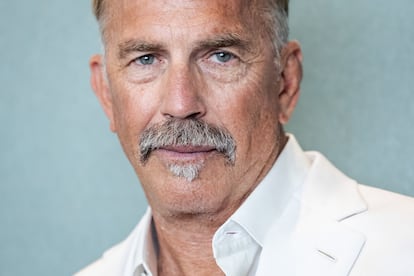
In The Big Chill (1983), he was meant to rub shoulders with Glenn Close and Kevin Kline, but ended up being a corpse that only appears on screen for a few seconds. Just six years later, Kevin Costner was Hollywood’s biggest star and his name made any movie a success. The Bodyguard, A Perfect World, JFK and Dances with Wolves were back-to-back hits. But this period ended with Waterworld (1995), when the public decided they did not want to see him drinking his own urine or breathing with gills. That monumental failure pushed him off the throne, and he has never regained the spot.
Costner went from the Oscars to the Razzies and seemed condemned to “dad cinema” and supporting roles that appeal to viewers’ nostalgia. That was until the TV show Yellowstone — a sort of Bridgerton for middle-aged men — brought him back to the fore. Now, as he is about to turn 70, Costner has gone back behind the camera with Horizon: An American Saga, a new western epic. To help him fund the project, Costner took out a mortgage on a plot of land he bought to build a family home. “When I started making films they didn’t pay me anything, then they paid me a lot and now I have to pay,” he joked at the Cannes Film Festival, where the movie — the first in a four-part saga — was met with lukewarm reviews.
Costner has a close affinity with Westerns. He is descended from European immigrants who settled in the Great Plains, but he grew up in California, wandering around the different places where his father’s work as an electrical company operator took him. He was a better athlete than a student, standing out in basketball and baseball, and more than read books he liked to write poetry, sing in the choir and go to the movies. He was about to enroll in business school, but decided it was time he had “a talk” with himself.
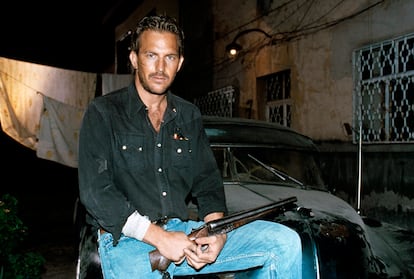
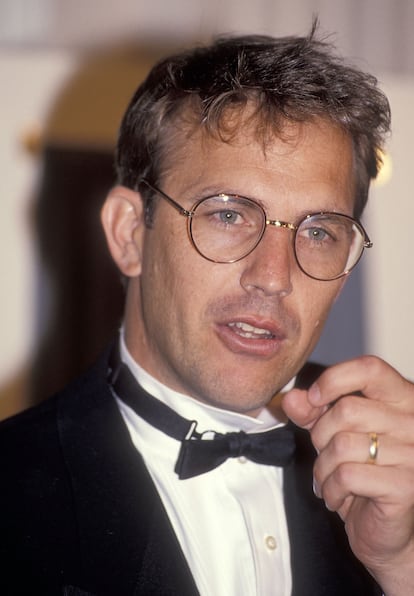
“I had a real talk with myself about what I wanted to do and whether I just wanted to please other people. And it was at that moment that I actually said to myself, ‘I’m interested in storytelling,’” he told Rolling Stone. A chance meeting on a plane with actor Richard Burton convinced him. Costner told Burton that he had always wanted to be an actor and the Cleopatra star’s response took away his doubts: “To be happy, we must fight for our dreams.”
And that’s exactly what he did. Costner packed his bags and moved to Hollywood. Before getting his first job as an actor, he was a tour guide, fisherman and truck driver. During one of those temporary jobs, he came across a group of electricians, who he worked with for a few days. To thank him for his efforts, they offered him a line of cocaine, as he revealed on the Dax Shepard’s Armchair Expert podcast. “I said to them, I said, ‘Hey, look, how much is that?’ And he says, ‘That’s about $20 right there,’ and I said, ‘Can I say something to you?’ And he says, ‘Yeah, fuck, of course, man, what?’ And I said, ‘Look, I’m trying to buy my first house,’ and I said, ‘If you think what I’m doing’s cool, I could use $20. I could take a twenty.’” They did not take that too well.
Costner did not have the spirit of a rebel, he had been raised in a conservative environment and has always been perceived as such in Hollywood, although he supported Barack Obama and Democrat Pete Buttilieg, the first openly gay candidate for the nomination for a U.S. presidential election.
His beginnings in Hollywood soon taught him about the challenges of the profession. In The Big Chill, he played a key character who appeared in flashbacks. But in the editing room, the director, Lawrence Kasdan, realized that this character would not work if he physically appeared on screen: his entire performance was cut and only the scars on his wrists are seen.
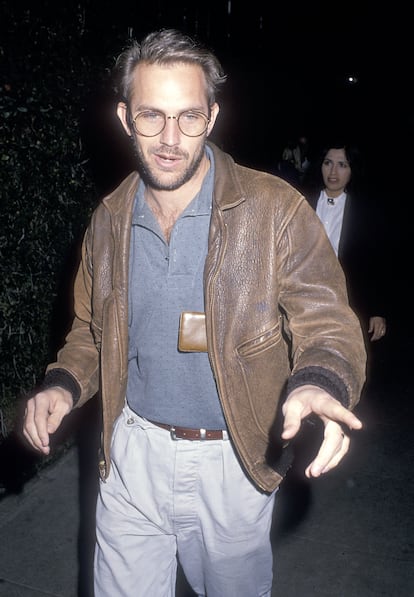
Kasdan felt so bad about what happened that he promised him a role in his next film, the western Silverado (1985). And Costner knew how to take advantage of it. Eric Pleskow, CEO of Orion Pictures, was captivated by his talent.
When Don Johnson gave up the role of Eliott Ness in The Untouchables due to the demands of simultaneously filming Miami Vice, Brian de Palma asked Kasdan what it was like to work with the handsome and lanky guy. He landed the lead role. Not even Robert De Niro, who had gained 30 kilos to play Capone, or Sean Connery, who ended up winning the Oscar, could outshine him.
“I want my movies to stand for something. See, actors have been role models for me. They’ve taught me how to live. It’s not that Henry Fonda was as good as the men he played, but in his great movies, his characters dealt with dilemmas,” Costner told Vanity Fair in 1989. “I believe in the romanticism. I believe movies have made me a better person.”
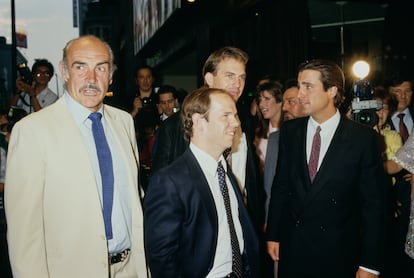
Orion Pictures offered Costner the opportunity to star in any of the films under development and he chose a successful thriller, No Way Out (1987), with Gene Hackman and Sean Young. This was followed by two baseball films that are considered the most iconic of the genre: Bull Durham (1988) and Field of Dreams (1989).
In Bull Durham, he was able to show off his skills as a baseball player and hit two home runs in front of the camera. The film, directed by Rob Shelton, pitted him against an emerging Tim Robbins and an established Susan Sarandon and gave him an unforgettable monologue. It made more than it cost and Sports Illustrated called it one of the best sports film of all time.
After that unexpected success, director Phill Alden Robinson, who thought Costner would be the perfect person to play Ray Kinsella in Field of Dreams, later ruled out the idea because “no one in their right mind would make two movies about baseball in a row.” Robinson offered the role to Robin Williams, but the script ended up reaching Costner, who called it “probably our generation’s It’s A Wonderful Life.” When Williams was out of the running, Costner took on the role of the guy who builds a baseball field in a cornfield because voices tell him to do it: “If you build it, they will come.” It became an American classic, whose enduring legacy was made clear in John Mulaney’s hilarious summary of the movie at this year’s Oscars.
Costner then turned down roles in Mississippi Burning (1988) and Betrayed (1988), two of the most brilliant films of the 1980s, which went to Willem Dafoe and Tom Berenger, respectively. And said yes to Revenge (1990), Tony Scott’s excessive melodrama that The Washington Post called “little more than Dynasty with shotguns.”
To prove that he was more than just a heartthrob (even though he stayed away from passionate sex scenes), he got behind the cameras for the first time and directed, co-produced and starred in Dances with Wolves, a vindication of the Western genre, which epitomized the cinema of and for the Oscars, with its lukewarm condemnation of the Sioux extermination and gentle environmentalism. The public was won over by the classic story and the movie received almost unanimous critical acclaim. Almost unanimous: Pauline Kael said it was an “epic made by a dull megalomaniac.”
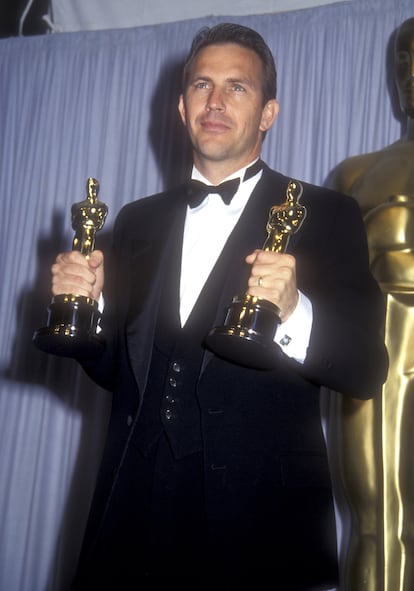
Costner did not win over Madonna either. In the prophetic documentary Truth or Dare (1991) she is seen pretending to vomit after Costner greeted her in her dressing room after her concert, which he described as “neat.” A gesture that did not go unnoticed by the actor. “Yeah, I was embarrassed by it and kind of hurt by it. I just went back there because I was asked to go back. And I found the best word that I could. I never called her on it or whatever,” he revealed years later to the Los Angeles Times. A decade later, at a Madonna concert that Costner attended with his daughters, the singer publicly apologized to him. “Ninety-eight percent of that audience didn’t know what she was talking about,” he confessed, “but I appreciate it from the bottom of my heart, and that meant more to me than you could ever know.”
Hollywood was not as dismissive of him as Madonna and gave him seven Oscars, including Best Picture and Best Director for Dances with Wolves. With the industry at his feet, he could do whatever he wanted to. And that’s exactly what he did: his character Locksley Robin in Robin Hood: Prince of Thieves (1991) was easy to imagine wearing jeans and chewing gum. The movie was still a success, perhaps due to the centerpiece of its soundtrack: (Everything I do) I do it for you by Bryan Adams.
Costner also found success with JFK (1991), where he played another of those American heroes that he is so fond of, prosecutor Jim Garrison, who was in charge of the investigation into the Kennedy assassination. The Oliver Stone movie made over $200 million at the box office.
But The Bodyguard (1992) made double that figure. The world was dazzled by Costner and his co-star Whitney Houston, and the movie soundtrack remains the best-selling in the history of cinema. Thanks to a handful of crazy scenes (does anyone else need to check if a katana can really cut a scarf in the air?) it became a perfect example of a guilty pleasure viewing.
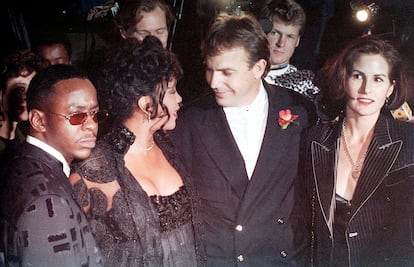
But Waterworld (1995) proved that no one is too big to fail in Hollywood. During filming, everything that could go wrong did go wrong: some problems were attributable to Costner, who handed over direction to his friend Kevin Reynolds, who had little experience in handling million-dollar budgets; others could not have been predicted, like the two hurricanes that destroyed the sets. It cost three times its initial budget and was released to little enthusiasm. But it did not actually lose money (it eventually become profitable after the box office losses), nor did the critics pan it like other megalomaniac disasters, see John Travolta’s Battlefield Earth. It was a very personal project that reflected a real concern of Costner’s, a committed environmentalist who in 1995 acquired Ocean Therapy Solutions, a company that develops centrifuges to separate oil from water.
“When I see that there is a problem, I try to solve it with my money,” he told EL PAÍS during the presentation in Spain of the movie Black or White. Waterworld cost Costner his money, his reputation and his marriage to Cindy Silva, his longtime partner with whom he had three children. After 16 years of marriage, he had to pay her $80 million.
The divorce proceedings were fodder for the tabloids, as were the details of his second divorce. In 2023, after 18 years of marriage and three more children, he separated from Christine Baumgartner. Her inordinate child support demands — grounded on claims that their children have luxury “in their DNA” — made more headlines than almost all of Costner’s films in the 21st century.
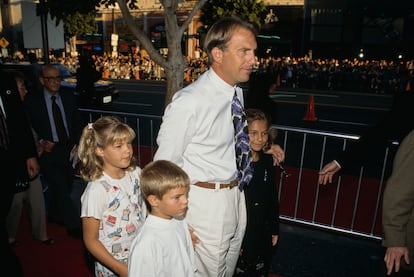
After the slow-motion disaster that was Waterworld, the actor did not learn his lesson and crashed again with The Postman (1997), another ego project, but by then, no one was watching. His movies continued to flounder. Costner’s only box office success was as Jonathan Kent, Superman’s father, in Man of Steel, and in a supporting role in Hidden Figures (2016).
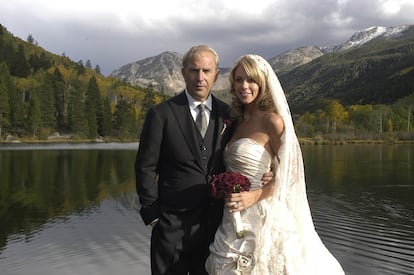
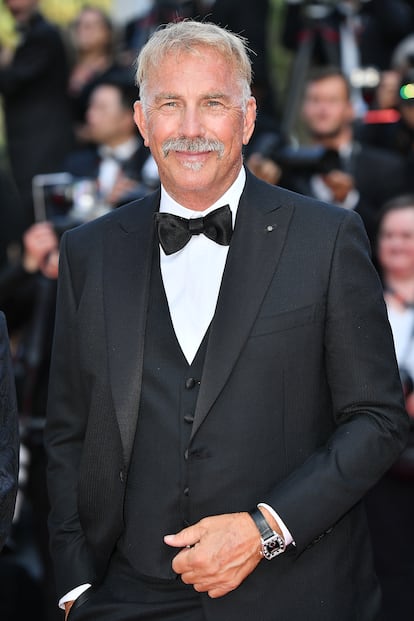
But it’s been television — first Hatfields & McCoys (2012) and then Yellowstone (2018) — that has breathed new life into his career. That did not stop Costner from leaving Yellowstone, although to the delight of his many followers, he has hinted that he could appear in the sequel.
As Costner approaches 70, he does not seem to be affected by the poor reviews of Horizon: An American Saga. At least that’s what his past statements suggest. “If you want to look at a high point in my life, it wasn’t a movie, it wasn’t Dances, it wasn’t Bull Durham. It was that internal talk I had with myself, where I said, ‘I don’t give a shit what anybody says, this is what I want to do, and I’m burning my ships like Cortés, and I am going to go where my heart wants to go. And I’m never again going to not do that in my life, and I’m not going to be caught up in trends and what’s popular.”
Sign up for our weekly newsletter to get more English-language news coverage from EL PAÍS USA Edition
Tu suscripción se está usando en otro dispositivo
¿Quieres añadir otro usuario a tu suscripción?
Si continúas leyendo en este dispositivo, no se podrá leer en el otro.
FlechaTu suscripción se está usando en otro dispositivo y solo puedes acceder a EL PAÍS desde un dispositivo a la vez.
Si quieres compartir tu cuenta, cambia tu suscripción a la modalidad Premium, así podrás añadir otro usuario. Cada uno accederá con su propia cuenta de email, lo que os permitirá personalizar vuestra experiencia en EL PAÍS.
¿Tienes una suscripción de empresa? Accede aquí para contratar más cuentas.
En el caso de no saber quién está usando tu cuenta, te recomendamos cambiar tu contraseña aquí.
Si decides continuar compartiendo tu cuenta, este mensaje se mostrará en tu dispositivo y en el de la otra persona que está usando tu cuenta de forma indefinida, afectando a tu experiencia de lectura. Puedes consultar aquí los términos y condiciones de la suscripción digital.









































